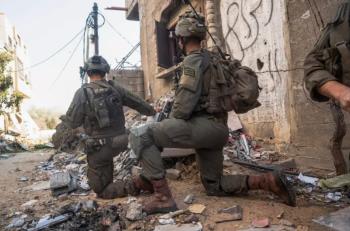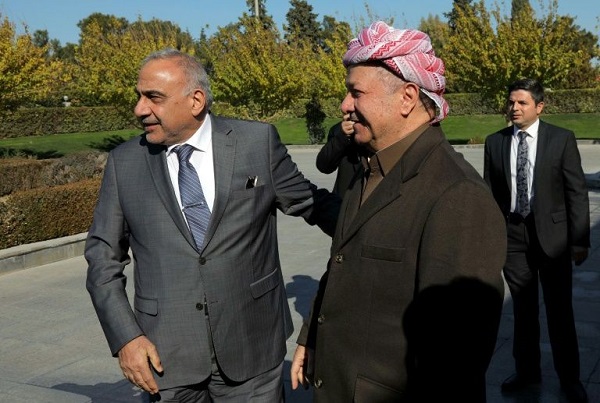Alwaght- While caught in the middle of a highly tense political and security situation, the resigned Iraqi Prime Minister made a visit on January 12 to the Kurdish autonomous region where he met with Kurdistan Regional Government (KRG) officials for the first time since he assumed the office in October 2018.
The visit to Erbil comes while the country is grappling with three crises. First, after over 100 days, the street anti-government protests in some cities of the country have shown no signs of winding down. Second, over the past two weeks, the US regime's assassination of Iran’s General Qassem Soleimani and Iraq’s Abu Mahdi al-Muhandis made Iraq once again a setting for Washington-Tehran tensions. Meanwhile, the assassination of General Soleimani, the commander of Iranian IRGC’s Quds Force, and al-Muhandis, the deputy commander of Iraq’s Popular Mobilization Forces (PMF), provoked a bill by the Iraqi parliament to expel foreign forces from Iraq. And third, the PM replacement crisis is still unfolding as the political factions are still away from an agreement on a candidate.
Despite that all, PM Abdul Mahdi as a caretaker head of the cabinet headed to Erbil and talked with Nechirvan Barzani, the president of the KRG, Masrour Barzani, the PM, and Masoud Barzani, the leader of Kurdistan Democratic Party and the former KRG president.
Jointly emphasizing that Iraq should not be reckoning ground for other actors
Certainly, the top case of discussion of the two sides was the recent developments in the country. In the wake of the US assassination of the Iranian and Iraqi military commanders, which led to a rejuvenated crisis, Abdul Mahdi’s government went under heavy pressures. On the one side, the government had to counter the violation of the territorial integrity and national sovereignty by the Western coalition and on the other side it had to meet the obligation of expelling foreign forces put on its shoulder by a parliament’s bill.
These issues made Iraq a ground for Iranian-American reckoning. As an initial response to the US crime, Iran’s Islamic Revolutionary Guards Corps launched missile strikes on the US military base of Ein Al-Assad in Al-Anbar province and another one also hosting American troops in Erbil. Now the Iraqis have growing concerns about further escalation, though a majority of the Iraqi officials defend the Iranian action as retaliation to the illegal attack on a top general who crushed ISIS terrorist organization in Iraq and Syria.
Meanwhile, Abdul Mahdi and other Iraqi leaders are aware that keeping Iraq from being a field for regional and international conflicts requires the bilateral cooperation of the Iraqi central government and the autonomous region in the north. This was a primary case in the bilateral discussions, according to reports emanating from Erbil.
KRG’s PM Barzani after the meeting posted a Twitter message expressing his happiness about Abdul Mahdi’s visit to Erbil, saying two sides are committed to continuing constructive dialogue. He added that the PM insisted on the de-escalation of tensions in the country and that Iraq and Kurdistan region should not be part of regional disputes.
Baghdad-Erbil sharing stances on US forces expulsion bill
After the expulsion bill was approved by the parliament, Baghdad was worried that Erbil may cause a big crisis by going against the central government’s resolve to expel the American troops in the country.
Abdul Mahdi needed to make sure that the Kurdish leaders will not pave the way for US military stay by unauthorized agreements with Washington. He discussed the issue with the KRG leaders. It is noteworthy that Barzani made it clear that Erbil is compliant with Baghdad’s decisions in the case of American forces and other security cases. Such considerable coordination between Baghdad and Erbil in the middle of the current situation can be well deemed a substantial defeat to the Americans in Iraq. It seems that just unlike in the past, now Erbil no more wants to test its power against Baghdad. Moreover, the Kurds now have the conviction that the US is not a reliable ally for them in the time of crisis and it will eventually have to leave the region. So, they conclude that they should not ignite tensions and disputes with their neighbor Iran.
Seeking a solution to latent unsettled Baghdad-Erbil disputes
In addition to discussions surrounding the foreign actors in the country, Abdul Mahdi’s visit sought to also shed light on disputes between Baghdad and Erbil remaining unsettled since 2003. After 17 years, the central government and Erbil remain at odds in some cases including implementation of the constitution’s article 140 on disputed regions, budget, military forces, oil sales, and bilateral economic contracts. Though in various times two sides tried to solve their problems, they have not yet found a solution to them.
During the visit, Abdul Mahdi raised the disputes with the Kurdish officials. During meetings with PM Barzani and also Deputy PM Qubad Talabani, the Iraqi PM praised the “appropriate grounds for dialogue” now present to Baghdad and Erbil saying that now there is a proper opportunity for the central government and the KRG to discuss the disputes and settle them to the best interests of the whole Iraqi nation. The comments won a welcome from PM Barzani and his aide both of whom highlighted the existence of serious resolution to fundamentally solve the problems between Erbil and Baghdad and implement the already-reached agreements.
Further Baghdad-Erbil security cooperation
Abdul Mahdi and Kurdish leaders also asserted that they need to cooperate in security to repel the threats their country faces. Despite the defeat of ISIS and the obliteration of the self-proclaimed caliphate of Abu Bakr al-Baghdadi, the terrorist organization still has underground presence in the Iraqi border regions. Both Baghdad and Erbil share fears about possible re-emergence of the organization that committed heinous crimes against Iraqi and Syrian people.
Meanwhile, these concerns are even doubled as the foreign forces, mainly the so-called anti-ISIS international coalition, are said to leave the country. This emboldens Baghdad and Erbil to engage in security cooperation, something discussed during the meetings. The resigned PM talked about the latest Iraqi developments and ways to secure Iraq’s sovereignty and thwart ISIS threats. He was told by PM Barzani that ISIS remains a serious threat to all Iraqi regions and so Baghdad-Erbil coordination in association with the international coalition is essential.



























